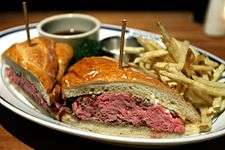Francesinha
Francesinha (meaning Little Frenchie or simply Frenchie in Portuguese) is a Portuguese sandwich originally from Porto, made with bread, wet-cured ham, linguiça, fresh sausage like chipolata, steak or roast meat, and covered with melted cheese and a hot and thick spiced tomato and beer sauce. It is typically served with french fries.
| Type | Sandwich |
|---|---|
| Place of origin | Portugal |
| Region or state | Porto |
| Main ingredients | Bread, ham, linguiça, fresh sausage (chipolata), steak or roast meat, cheese, spiced tomato and beer sauce |
History
.jpg)
Daniel da Silva[1], a returned emigrant from France and Belgium, tried to adapt the croque-monsieur to the Portuguese taste when he moved to Porto. He first created the special sauce and populated the sandwich with local meats in 1953 at 'A Regaleira', a restaurant in Rua do Bonjardim, Porto; the Francesinha quickly became a very popular dish and deeply associated with the city, although it can sometimes be found elsewhere in Portugal. A classic francesinha meal would include the sandwich, surrounded on a bed of chips doused in the famous sauce, and complemented with a fino, which in this context refers to draught beer.
Locals will have their favorite restaurant with the best Francesinha in town, typically arguing about the quality of the sauce (a secret recipe that varies by restaurant) and the quality of the meats.
Availability
Porto and its surroundings is the traditional area of the francesinha, with many restaurants and cafés serving it. It can also be easily found in several other places across the north of Portugal. In the center and south of Portugal it may be harder to find, but there are an increasing number of restaurants, bars, and cafés serving it, especially in tourist destinations like beach resorts ranging from Figueira da Foz to Albufeira. In Lisbon, a number of bars and restaurants serve varied types of francesinha, including variations served with green sauce. Francesinha standard sauce bottles have been sold in supermarkets across the entire country since the 2000s, which may be related with a growth of the sandwich's popularity outside Porto Metropolitan Area.
Variations

There is no standard recipe for the francesinha. Different restaurants in Portugal have special variations, such as:
- Café Barcarola (Porto): Francesinha à Barcarola - A Francesinha Especial with prawns and shrimp;
- Café Ábaco (Porto): Francesinha de carne assada - A Francesinha Especial with roast pork;
- A Cascata (Porto): Francesinha à Cascata - A Francesinha Especial with mushrooms and cream;
- Restaurante Cunha (Porto): Francesinha à Cunha - Extremely large Francesinha.
The Francesinha Especial (Special Francesinha) is a Francesinha with egg and / or potato chips. Other variations of the original include fillings such as pork, chicken, pastrami, tuna, codfish and vegetarian options.
Sauce
Francesinha sauce is a secret, with each establishment having its variation. The only common ingredient is beer. Most, though not all, sauces are tomato based and vary in their degree of spiciness. The color is usually red or orange. Different restaurants that serve Francesinha are characterized based on how good their sauce and mix of meats is perceived to be.
Regional variants
Francesinha poveira is a form of francesinha distinctive to Póvoa de Varzim, north of Porto. Also created in the early 1960s. The poveira form uses different bread and sauce to form a sandwich that can be eaten by hand.
Pica-pau is a breadless variant in which a steak is cut into bite-sized pieces and covered with sauce. The name pica-pau (woodpecker) references the traditional means of consumption with small skewers or toothpicks—making the diner "peck" at the dish.
Reception
The Daily Meal included the francesinha in their article "12 Life-Changing Sandwiches You've Never Heard Of".[2]
References
- "Diário de Notícias". www.dn.pt (in Portuguese). Retrieved 2018-12-15.
- Dan Myers (27 February 2015). "12 Life-Changing Sandwiches You've Never Heard Of". The Daily Meal. Retrieved 2015-03-03.
Further reading
- "How to Pronounce Francesinha". Forvo.
- Izabela Cardosa (20 Oct 2019). "Portugal's most iconic sandwich was named after a French traveler in the 1950s" (Video with transcript). Business Insider.
- Nina Santos (8 Jun 2017). "11 Things You Should Never Say in Porto". Culture Trip.
- Kevin Gould (8 Aug 2016). "Porto's francesinha sandwich is a gut buster". The Guardian.
- Brenna Holeman (18 Jan 2014). "Trying Francesinha in Porto". This Battered Suitcase.
External links
| Wikimedia Commons has media related to Francesinha. |
- (in Portuguese) Francesinhas - History of the Francesinha
- (in Portuguese) Francesinha Póveira
- (in Portuguese) Irmandade da Francesinha - Ranking and evaluation of Francesinhas

